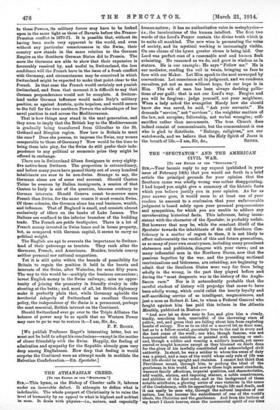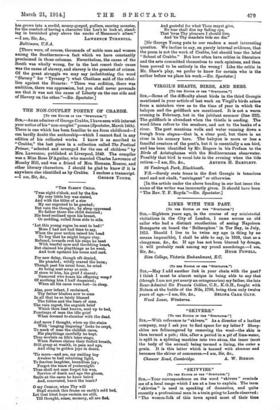THE " SPECTATOR " AND THE AMERICAN CIVIL WAR.
[TO Tex Terms OP THII "Byre...vox:] Sin,—Your laconic reply to my request (published in your issue of February 14th) that you would set forth in a brief article the principal grounds for your opinion that the Southern cause was wholly wrong was rather disappointing. I bad hoped you might give a summary of the historic facts which you believe justify you in your opinion. As far as your answer goes, it would seem to at least one of your readers to amount to a confession that your unfavourable judgment is based solely upon your personal prepossessions and sympathies, for which you are unable to adduce any corroborating historical facts. This inference, being incon- sistent with the character of the Spectator, is probably unfair. But however that may be, while the constant illwill of the Spectator towards the inhabitants of the old Southern Con- federacy is a matter of regret to them, it is not likely to affect unfavourably the verdict of this and future generations, as so many of your own countrymen, including many prominent statesmen and publicists, disagree with your views; and as many influential men in the Northern States, now that the passions begotten by the war, and the preceding sectional recriminations and bitterness, are subsiding, are beginning to admit that the Southern States were -very far from being wholly in the wrong, in the part they played before and during the "most desperate war in the history of the Anglo- Saxon race." Nor is it antecedently probable that the careful student of history will prejudge that cause to have been wholly wrong, which could enlist the hearty loyalty and self-sacrificing service of so intelligent, magnanimous, and just a man as Robert E. Lee, to whom a Federal General who fought against him has paid this tribute in the Atlantis Monthly, published in Boston :— "And now let us draw near to Leo, and give him a steady, kindly, searching look, unmindful of the showering stars of yellow, red, and green that are falling about him from exploding bombs of eulogy. Nor as to an idol or a marvel let us draw near, but as to a fellow-mortal, genuinely true to the real in every and the beat sense of the word ; one who, though famous, was not honeycombed with ambition or painted with cunning or cant: and, though a soldier and wearing a soldier's laurels, yet never craved or sought honours except as they bloomed on deeds done for the glory of his lawfully constituted and acknowledged civil authority. In short, he was a soldier to whom the sense of duty was a gospel, and a man of the world whose only rule of life was that life should be upright and stainless. I cannot but think that Providence meant, through him, to prolong the ideal of the gentleman in this world. And now to these high moral standards, warmest family affections, imperial qualities, and characteristics, add wealth, station, and imposing stature, a noble countenance, and abilities of the first order, and as the background of these notable attributes, a glowing series of rare victories in the cause of the Confederacy, with its appealingly tragic life and death, and it can easily be seen why, through the natural impulses of our nature, Lee has become the embodiment of one of the world's ideals, the Christian and the gentleman. And from the bottom of my heart I thank heaven, since the commercial spirit of our time
has grown into a sordid, money-gorged, godless, snoring monster, for the comfort of having a character like Lee's to look at, stand- ing in burnished glory above the smoke of Mammon's altars."
[There were, of course, thousands of noble men and women among the Southerners—a fact which we have constantly proclaimed in these columns. Nevertheless, the cause of the South was wholly wrong, for in the last resort their cause was the cause of slavery, and slavery is the greatest of crimes. Of the great struggle we may say (substituting the word "Slavery" for "Tyranny") what Chatham said of the rebel- lion against the Stuarts: "There was sedition, there was ambition, there was oppression, but you shall never persuade me that it was not the cause of Liberty on the one side and of Slavery on the other."—En. Spectator.]











































 Previous page
Previous page